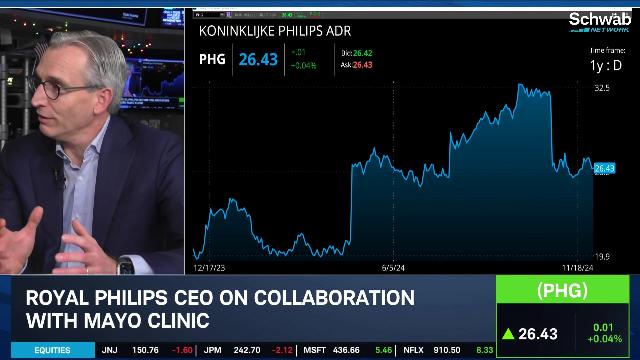- Market Minute
- Posts
- Market Minute: Weekend Spotlight on Royal Philips (PHG)
Market Minute: Weekend Spotlight on Royal Philips (PHG)

Royal Philips (PHG) is a behemoth in the healthcare tech space, making everything from the electric toothbrush or razor by your sink, or baby bottles and sun lamps, to ultrasound, oxygen, and MRI machines. PHG shares are up over 12% year-to-date, but fell sharply after its last earnings report, where it cut guidance. We interviewed CEO Roy Jakobs to talk about what’s next, especially with regards to A.I. in the health space.
A quick overview: Royal Philips, aka Koninklijke Philips, was founded in the Netherlands in 1891. It began as an electronics company, with lightbulbs as one its first products. It invented cassettes and compact discs, helped launch Blu-Ray with Sony, and even dabbled in the entertainment industry. IEEE Spectrum wrote about Philips’ involvement in the Phoebus lightbulb cartel in the 1920s, where as part of the scheme manufacturers lowered the lifespan of a bulb to 1,000 hours from between 1,500-2,000. It began to focus on health care specifically in the 1990s, amid competition and innovation difficulties.
Interestingly, a joint venture with ASM International in 1984 led to ASML (ASML), a semiconductor company we discuss often – but its storied 130-year history is full of fascinating spin-offs and strategy shifts.
With so many products, issues inevitably arise – its subsidiary Philips Respironics struggled with its enormous CPAP machine recall beginning in 2021, after announcing that foam used in the equipment could degrade and send particles into users’ lungs. However, according to reporting by ProPublica & the Pittsburgh Post-Gazette, Philips Respironics had known about the problem since at least 2011 and concealed it from the FDA. It agreed to pay $1 billion to patients claiming they were injured in order to settle over 700 lawsuits related to the machines.
Previous CEO Frans van Houten stepped down in 2022 in the middle of the recall as shares fell over 50%, or about $30 billion of the company’s worth. I partially covered this story when discussing competitor ResMed (RMD) in a previous column.
To add insult to injury, one of the companies that Philips used to send replacements from the recall, Lincare, secretly took its money and sent machines to new customers instead, according to a recent bombshell report from ProPublica that helped oust Lincare’s COO.
So, Roy Jakobs’ job is to move past these recent devastating health and financial blows and loss of consumer trust and focus on future innovation. “Health care is in a crisis,” he says, with understaffing and a lack of affordability. Jakobs notes that hospitals are struggling with revenue losses across the U.S., though that is beginning to rebound from Covid. Thus, Philips is now focusing on “giving time back to the caregivers” and making routine services cheaper by integrating A.I.
Outside the U.S., Philips is seeing some challenges: China is “further deteriorating” in the consumer and health markets, causing Philips to cut its full-year guidance in October. He says “we will be ready” when growth comes back to the Chinese market, but its economy needs to improve before that will happen. For now, he says Philips is concentrating on innovation and improving margins.
“A.I. is having value now,” Jakobs underlines, bringing up Philips’ collaboration with Mayo Clinic. Philips has created a mobile, helium-free MRI machine, and is looking to add A.I. into the analysis of the images. He especially focuses on the speed aspect of these innovations: “You can double the amount of patients you can scan in an hour,” he says, a massive win as, for example, Alzheimer’s patients (a growing demographic) need scans four times a year.
In addition to helping healthcare professionals, Philips collaborates with a children’s hospital to make the patient experience more comfortable by making “better ambience” for imaging, with quieter machines and A.I. analysis to compensate for patients moving inside the machine. The overall goal is comfort, speed, and less repeat scans.
With MRI machines as just one example, Philips is showing its worth as a cutting-edge tech innovator. High-level partnerships and proprietary analysis algorithms can give the company an edge in demand and client stickiness. If Philips can execute its plan to make healthcare quicker, more efficient, and more affordable, by all means, full speed ahead.
However, healthcare technology holds people’s lives in its hands, whether physically working improperly like with the CPAP machines, or offering up faulty analyses to stretched healthcare workers if the A.I. algorithm doesn’t nail it. The company’s massive size means it can absorb blows across its different sections, but it also creates more chances to go wrong. It also means that if it has a runaway success in one area, it might not impact the bottom line as much as a smaller, more focused company. Either way, this century-old giant will keep charting its course into the unknown.
Video Of The Week
Featured Clips
Tune in live from 8 a.m. to 5 p.m. ET, or anytime, anywhere, on‑demand.
Or stream it via thinkorswim® and thinkorswim Mobile, available through our broker-dealer affiliate, Charles Schwab & Co., Inc
Please do not reply to this email. Replies are not delivered to Schwab Network. For inquiries or comments, please email [email protected].
See how your information is protected with our privacy statement.
Charles Schwab and all third parties mentioned are separate and unaffiliated, and are not responsible for one another's policies, services or opinions. Schwab Network is brought to you by Charles Schwab Media Productions Company (“CSMPC”). CSMPC is a wholly owned subsidiary of The Charles Schwab Corporation and is not a financial advisor, registered investment advisor, broker-dealer, or futures commission merchant.




